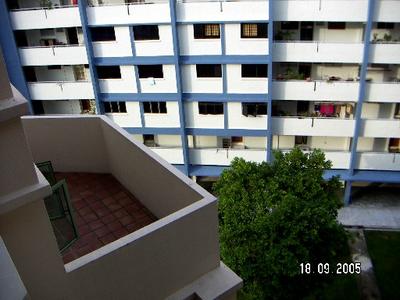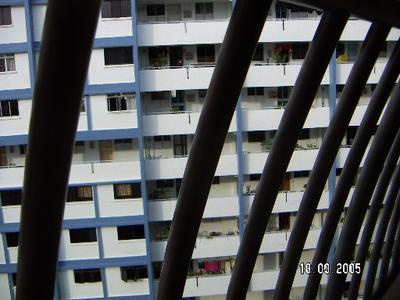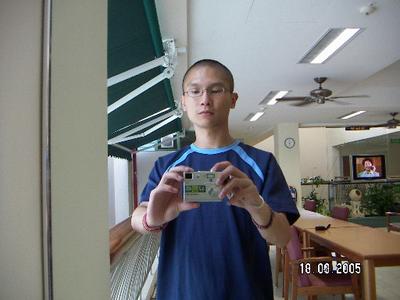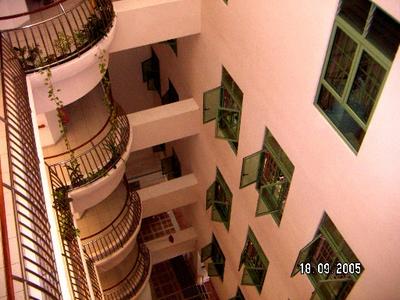The following was written primarily on my flight back to Singapore. Some minor corrections have been made. Having considered its implications, I think I am ready to post it. Friends and family and others have been very supportive in recent days. So ... (takes a deep breath) ... I recall writing on the BA vomit bag the first time I flew back from the UK. I wrote on it, in part because it seemed cool at the time. In part because I didn't have proper paper to write on. This time, it is the same.
The plane looks like it is going to take off soon. At the moment, it is re-aligning itself on the runway, and rays of autumnal sunlight are streaming into the plane.
This departure from London has been very difficult, and it is by far the most difficult I have experienced. I am not only leaving behind my second home, virtually for good, but am also leaving behind the love of my life. Over the past hour, I have cried and cried. Before I let myself cry any further, well, the obsessive compulsive part of me, the bit that insists on charting and recording important moments of my life, must be allowed to kinda express my emotions as well, by letting it do its thing.
I will perhaps start with the details of the last 36 hours or so ...
Mary Poppins. It was Jonny's birthday on Thursday, the primary reason why I have extended my stay in London from the 30th of August to the 17th of September. We have both wanted to watch it for some time. Also, Jonny had said that he loved experiences, and so, I decided that Mary Poppins would perhaps be the best bday gift I could get him. So, we watched the matinee in Thursday, in seats G16 and G17. 7th row, right smack in the middle. And right under the falling white and pink petals, and a perfect spot to wave to Mary from and catch her attention as she soars away at the end.
(Oooh! The smell of food!)
(Looks to the window and waves bye to London. It's so beautiful, innit?)
Back to Mary Poppins. It was a fantastic show. Great songs, brilliant cast, fantastic set. All in all, an unforgettable production that caterpaults itself to the very top of my musicals rankings (even Joseph).
We went back to ours after the musical, as we both had a headache, probably caused by the dehydration from all the crying the night before. Jonny was originally to go for a Buddhist meeting, but it was cancelled as quite a few people couldn't make it.
So we had time to rest before going to Bertorelli in Soho for dinner at just after 9, using the Sante Online voucher :p. We shared a spinach cooked in butter and a vanilla cheesecake with raspberry sauce. My main course was a pizza with marinated vegetables (including ... the artichoke) and Jonny ordered a risoto of the day. Jonny also had a red Chianti which was characteristically yummy.
It was late when we finished dinner, prolly about 10.30 ish? So it was too late to go to the Sauna Bar. (Besides, I had a Jonny massage already, which is far better than any other, Thai, Swedish and whatever. :p) We decided to ...
(Wow! The Singapore Airlines notepad just arrived. It is tres funky! Nice patterns and comes with a lovely set of postcards and envelopes.)
(Listening to James Blunts 'Goodbye My Lover' right now)
... go to the Yard instead, to where we had our first date together, to see the sofa (on the first floor) where we kissed and hugged and fell asleep on. The sofa was occupied though, and the camera ran out of batteries so we left without a photo. But its image will forever be etched in my memory.
On the way back, we took a look at the Soho Book Store (opposite the internet cafe) and checked emails to see whther Dan had replied. He did, and we sent off an email asking whether it would be good to meet up at Charing Cross Road's Borders, at 6.30 pm, and that we would probably be wearing matching animal t-shirts (we didn't eventually though, because it got too cold).
Then home, and to bed. Hugz and snugglez.
Before I forget, before going out to dinner, we went downstairs to take photos with the hallmates. Jonny was wearing the blue guinea pig tee-shirt, and me the red froggy one, which we got together at Camden market.
(I am actually currently wearing the frog shirt in my second layer right now. The inner most layer is Jonny's Keith Haring 'alien' t-shirt.)
The photographs are on an earlier posting in this blog.
Friday morning. The usual distractions, making Jonny a little later than he should be. As usual. I got up earlier than normal to get the washing done, and to do all the errands, and the stuff I have left to the very last day to do.
Went to the Institute to check emails. Went to John Adams Hall (after trying the Finance office) to find out how to get the hall deposit back. Thought of asking them to write a cheque to Jonny, but apparently, it was the usual thing. (Duh!)
Ran to Argos to get a weighing machine. And grabbed cash from Natwest and a vegetable pasty for Greggs along the way. Ran back to weigh my luggage, and it came up to ... 40 kg, even though not everything was filly packed yet. So I grabbed the box of books, frantically taped it up with parcel tape and ran to the postroom to send it off. 35 pounds, much cheaper than Royal Mail. Luckily, managed to the post room just a minute or two before it closed.
Then check emails again. Printed out Sante vouchers for Jonny, Tim, Victor and Dan, and ran back to BP to get the camera and the Compact Flash card. Ran to Jessops to print out copies of Thursday's photos for him, and a set for myself.
Bumped into Tim and Nick just outside Jessops, while going to meet them at Virgin. We went to Virgina and HMV to find the latest Mary Poppins CD. Got it at 14.39 ish at HMV with the student discount.
Then to Monmouth coffee place, and Ben's cookies, and to Boots and then back to Monmouth coffe place to meet Victor.
(Sorry Wilson for not getting you any cookies, no space liaoz lar)
(Tim, must try your coffee some time ah! :p)
Then Borders to meet up with Jonny and Dan and Melanie. We went to Costa, where I just had peppermint tea. Was sugared out by cookies and caffeined out at Monmouth's by then.
We went back for dinner, after grabbing some stuff and paying for these using the luncheon vouchers. Dinner was (canned) abalone, bacon slices, mange tout, oyster sauce, fish powder and rice noodle soup. Had dinner in the telly room. On telly was a programme on parents taking the GCSEs alongside their children.
Then we sang along to Mary Poppins. ANYTHING CAN HAPPEN IF YOU LET IT. TUPPENCE A BAG. Watched a bit of the DVD from Prowler's. Then bedtime...
I didn't want to go to bed. I wanted to keep the lights on, to stay awake to make the night stretch as long as it could. Alas, we were both tired, and next thing we knew, it was 9-ish in the morning.
I had a shower so that my hair would be clean for the haircut later. We had breakie of cereal and blackberries in soya milk. I then went to JA Hall to settle the deposit and to check emails again, while Jonny chanted, showered and packed my photographs for me into Ziploc bags and a box.
We then went together, via tube, to get sweat bands. Looked at Topshop, Niketown and then Prowlers. We got a black one at Niketown and a rainbow one at Prowler's each. If only they could be as warm and tight as Jonny's grasps. I miss him already. I really loved wearing Jonny's worn blue stripey sweatbands, even if it was just for a day (Friday). (Jonny, if you read this, DON'T mail the blue stripey sweatband over. I love you wearing it. :) )
Jonny had promised to get me a non-metal ring before. Sweatbands are sortov rings also hor, just that they encircle one's hands, rather than just the finger.
We grabbed two fish cakes and a portion of chips for lunch at the Endell Street chipshop and had them in the BP garden. (Somehow, I distinctly remember telling Jonny to wash his hands after moving the garden furniture and before lunch.)
Then a haircut. Jonny the barber! He's good! Gentle and firm and loving. I will miss the haircuts.
The food's here. I am hungry. But don't feel like eating.
Well, ate most of the main course, but cannot eat any more. Not much appetite.
We lift with Fitri at about 2.30 pm, and Ted walked us to the Holborn tube station.
We took the 2nd train, as the first was much too packed.
(By the way, Kelly Clarkson song on now.)
Got to Heathrow too quick. The queue was very long at the SQ counter. But still too quick.
Bumped into Carolyn, who was seeing her parents-in-law off.
We went to the loo. Peed. Then looked at ourselves in the mirror. Went to Boots to get moisturiser for Jonny.
(Just realised that we both forgot that I was the one who initially needed moisturiser, for the flight.)
Had early grey at Starbucks. Jonny had frothy milk with the tea!
We couldn't bear to leave Starbucks. Kept delaying going to the departure gate. We cried and cried. I reminded him that I love him, and also that I don't want him to move to Singapore to live if it's just for me. I told him that he has wonderful friends, a wonderful career and a wonderful family in England, and I don't want to deprive him of these. We wrote little notes on Starbucks cup-holders.
We stood a long time at the gate. Taking photos, hugging, holding hands.
Goodbye was very difficult.
Heathrow has certainly improved in efficiency. Went through security very fast.
Called Jonny. He said that the viewing gallery was closed so he could not watch my plane take off. So he decided to go back early.
I feel like I have left too much of myself behind, with him, in him. We have to keep in contact.
I do hope that he comes to Singapore. I hope that Tim, Hi Ching, someone will be able to help him find a good job.
I hope that there is a demand for art teachers in Singapore.
I called Tim, to say goodbye, and bye to Adrian. & Ted. Texted William, Rob, Gareth, Florian and Victor.
Left voicemails on Jonny's phone. Because he's on the tube, and I hope that he finds some way of recording of what I said to him.
I realise that my writing of this entry effectively outs myself (if other entries haven't already done so.)
Thinking about it. I think I have to out myself sooner or later. If I deny my gayness, I am not only being a liar, but also denying the love that I have for Jonny.
If I cannot be allowed or forbid myself to express such sentiments, then I am hiding a lot of myself, and it is too much to bear.
(I just refused the icecream, to the surprise of the stewardess.)
I want to be able to hold Jonny's hands to the end of days.
I love you, Jonny. x





